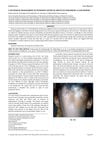 9 citations,
October 2019 in “Dermatologic Therapy”
9 citations,
October 2019 in “Dermatologic Therapy” Oral tofacitinib has a moderate success rate and is generally safe for treating hair loss in some patients.
 May 2023 in “Sučasna pedìatrìâ. Ukraïna”
May 2023 in “Sučasna pedìatrìâ. Ukraïna” An 11-year-old child with total hair loss may have a genetic autoimmune disease, and the outlook for hair regrowth is not good.
 51 citations,
September 2015 in “Medical Clinics of North America”
51 citations,
September 2015 in “Medical Clinics of North America” The conclusion is that acne, alopecia, and hyperhidrosis are common skin issues with various treatments available, and accurate diagnosis is key for effective management.
 March 2016 in “Journal of evolution of medical and dental sciences”
March 2016 in “Journal of evolution of medical and dental sciences” Combining OMP with cyclosporine can effectively treat severe alopecia areata in children.
 2 citations,
December 2020 in “American Journal of Dermatological Research and Reviews”
2 citations,
December 2020 in “American Journal of Dermatological Research and Reviews” The combination therapy was effective and well-tolerated, especially in young patients.
 2 citations,
December 2007 in “Expert Review of Dermatology”
2 citations,
December 2007 in “Expert Review of Dermatology” The document concludes that early diagnosis and treatment are key for pediatric hair loss disorders, and addressing the emotional effects on children is important.
 16 citations,
May 2017 in “American Journal of Clinical Dermatology”
16 citations,
May 2017 in “American Journal of Clinical Dermatology” The document concludes that more research is needed to understand and treat Beard Alopecia Areata due to limited current knowledge and evidence.

The document concludes that diagnosing female hair loss requires careful examination, with treatments varying by condition and psychological support often necessary.
 September 2023 in “Curēus”
September 2023 in “Curēus” Alopecia areata may be linked to hearing problems, so patients should monitor their hearing.
 12 citations,
March 2013 in “Cancer Causes & Control”
12 citations,
March 2013 in “Cancer Causes & Control” Early balding, especially frontal, increases prostate cancer risk; more research needed.
 64 citations,
November 2008 in “Journal of The American Academy of Dermatology”
64 citations,
November 2008 in “Journal of The American Academy of Dermatology” A new type of rapid hair loss called ADTA usually gets better on its own within 6 months.
 27 citations,
January 2005 in “American Journal of Clinical Dermatology”
27 citations,
January 2005 in “American Journal of Clinical Dermatology” Azelaic acid and anthralin are similarly effective for treating patchy hair loss.
 6 citations,
August 2006 in “Journal of Cutaneous Pathology”
6 citations,
August 2006 in “Journal of Cutaneous Pathology” Two teenage brothers had a rare, treatment-resistant form of female-pattern hair loss with unusual scalp changes.
 August 2018 in “Journal of The American Academy of Dermatology”
August 2018 in “Journal of The American Academy of Dermatology” The study concluded that a new method can effectively assess scalp sun damage in balding men, which increases with age and sun exposure.
January 2018 in “Springer eBooks” Alopecia totalis/universalis is a severe form of hair loss where all body hair is lost.
 3 citations,
January 2015 in “Nasza Dermatologia Online”
3 citations,
January 2015 in “Nasza Dermatologia Online” Some treatments for autoimmune hair loss work, but JAK inhibitors like tofacitinib are promising for regrowth.
10 citations,
January 2012 in “Case reports in medicine” Diphencyprone can cause unexpected and possibly permanent vitiligo.
18 citations,
January 2015 in “International Journal of Trichology” Intralesional steroids are more effective for hair regrowth in alopecia areata than NBUVB, but combining them doesn't improve results.
 9 citations,
May 2019 in “Journal of dermatological treatment”
9 citations,
May 2019 in “Journal of dermatological treatment” Apremilast helps regrow hair in hard-to-treat alopecia areata.
 295 citations,
January 2006 in “Journal of the American Academy of Dermatology”
295 citations,
January 2006 in “Journal of the American Academy of Dermatology” Alopecia areata, a common autoimmune hair loss condition, often runs in families.
 14 citations,
April 2014 in “Medical Clinics of North America”
14 citations,
April 2014 in “Medical Clinics of North America” The document concludes that quick referral and appropriate treatments are crucial for managing common skin conditions and preventing permanent damage.
 2 citations,
January 2021 in “Cureus”
2 citations,
January 2021 in “Cureus” Long-term anabolic steroid use can lead to heart and metabolic health issues.
 July 2023 in “International Ayurvedic medical journal”
July 2023 in “International Ayurvedic medical journal” Ayurvedic treatment can effectively manage PCOS and its symptoms.
 54 citations,
February 1986 in “Archives of Dermatology”
54 citations,
February 1986 in “Archives of Dermatology” Higher minoxidil concentration (5%) works better for severe hair loss, with most patients seeing regrowth in 48-60 weeks.
 January 2012 in “Postgraduate obstetrics & gynecology”
January 2012 in “Postgraduate obstetrics & gynecology” Up to half of women by age 50 experience significant hair loss, with various types and treatments available.
 32 citations,
July 2017 in “Clinical and Experimental Dermatology”
32 citations,
July 2017 in “Clinical and Experimental Dermatology” Finasteride effectively treats hair loss in transgender men with few side effects.
 85 citations,
October 2012 in “Dermatologic Clinics”
85 citations,
October 2012 in “Dermatologic Clinics” Alopecia Areata is an autoimmune condition often starting before age 20, with varied treatment success and a need for personalized treatment plans.
 January 2007 in “Elsevier eBooks”
January 2007 in “Elsevier eBooks” Alopecia areata is a reversible, autoimmune-related hair loss that can have significant emotional impact and uncertain treatment effectiveness.
 78 citations,
April 1984 in “Archives of Dermatology”
78 citations,
April 1984 in “Archives of Dermatology” Minoxidil can help regrow hair in alopecia areata patients.
 8 citations,
January 2020 in “International Journal of Trichology”
8 citations,
January 2020 in “International Journal of Trichology” Different patterns on the scalp help diagnose types of hair loss without needing a biopsy.



























